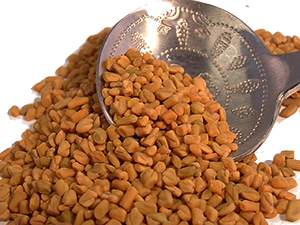Fenugreek
Avoid Fenugreek With PLD
Fenugreek has been known to increase a nursing mother's milk supply. For this reason taking fenugreek may contribute to liver cyst growth. However it is always a trade off when taking herbs, medications, and chemicals. The trade off comes about from trading one set of symptoms for another, however it is always between you and your doctor if the benefits outweigh the risks or the side effects. If one has only kidney cysts, fenugreek might be useful.
Fenugreek a naturally occurring edible spice, kills MCF-7 human breast cancer cells via an apoptotic pathway.
There is growing use of anticancer complementary and alternative medicines worldwide. Trigonella foenum graecum (Fenugreek) is traditionally used to treat disorders such as diabetes, wounds, inflammation, and gastrointestinal ailments. Fenugreek is also reported to have anticancer properties due to its active beneficial chemical constituents. The mechanism of action of several anticancer drugs is based on their ability to induce apoptosis. The objective of the study was to characterize the downstream apoptotic genes targeted by FCE in MCF-7 human immortalized breast cells. FCE effectively killed MCF-7 cells through induction of apoptosis,confirmed by terminal deoxynucleotidyl transferase-mediated dUTP nick end labeling (TUNEL) and RT-PCR assays. When cells were exposed to 50 μg/mL FCE for 24 hours, 23.2% apoptotic cells resulted, while a 48-hour exposure to 50 μg/mL caused 73.8% apoptosis. This was associated with increased expression of Caspase 3, 8, 9, p53, Fas, FADD, Bax and Bak in a time-and dose-dependent manner, as determined by real- time quantitative PCR. In summary, the induction of apoptosis by FCE is effected by its ability to increase the expression of pro-apoptotic genes and the spice holds promise for consideration in complementary therapy for breast cancer patients
Fenugreek Lowers Cholesterol
Food Chem. 2013 Jun 1;138(2-3):1448-53
Comparative study on hypocholesterolemic and antioxidant activities of various extracts of fenugreek seeds.
Belguith-Hadriche O, Bouaziz M, Jamoussi K, Simmonds MS, El Feki A, Makni-Ayedi F.
These results showed that the ethyl acetate extract of the fenugreek seeds had a significant hypocholesterolemic effect
and antioxidant activity in cholesterol-fed rats, whether this is partly due to the presence of flavono´ds in the extract needs further study.
Fenugreek Useful in Parkinson's
Phytother Res. 2013 Mar 20.
Efficacy and Safety of Standardized Extract of Trigonella foenum-graecum L Seeds as an Adjuvant to L-Dopa in the Management of
Patients with Parkinson's Disease.
Nathan J, Panjwani S, Mohan V, Joshi V, Thakurdesai PA.
Movement Disorder Clinic, Shushrusha Hospital, 698B, Ranade Road, Shivaji Park, Dadar (West), Mumbai, 400028, India.
Abstract
The objective of this study is to evaluate disease modifying efficacy and safety of a standardized extract of Trigonella foenum-graecum L,
Fenugreek (IBHB) (family Fabaceae) as a nutritional adjuvant to Levo-dopa (L-Dopa) in Parkinson's disease (PD) patients.
We conducted double-blind placebo-controlled proof of concept clinical study of IBHB capsules (300 mg, twice daily) with
matching placebo for 6 months of period in 50 patients of PD stabilized on L-Dopa therapy. The efficacy outcome measures
were the scores of Unified Parkinson's Disease Rating Scale (UPDRS - total and its subsections), and Hoehn and Yahr (H&Y)
staging at baseline and end of 6-months treatment duration. Safety evaluation included haematology, biochemistry, urinalysis
parameters and adverse event monitoring. Total UPDRS scores in IBHB treatment (0.098%) showed slower rise as opposed to steep
rise (13.36%) shown by placebo. Further, Clinically Important Difference for total UPDRS scores and scores of motor subsection
of UPDRS was found to be 5.3 and 4.8, respectively, in favour of IBHB treatment. Similar improvement was shown by IBHB in terms
of H&Y staging as compared with placebo. IBHB was found to have excellent safety and tolerability profile. In conclusion, IBHB
can be useful adjuvant treatment with L-Dopa in management of PD patients.
